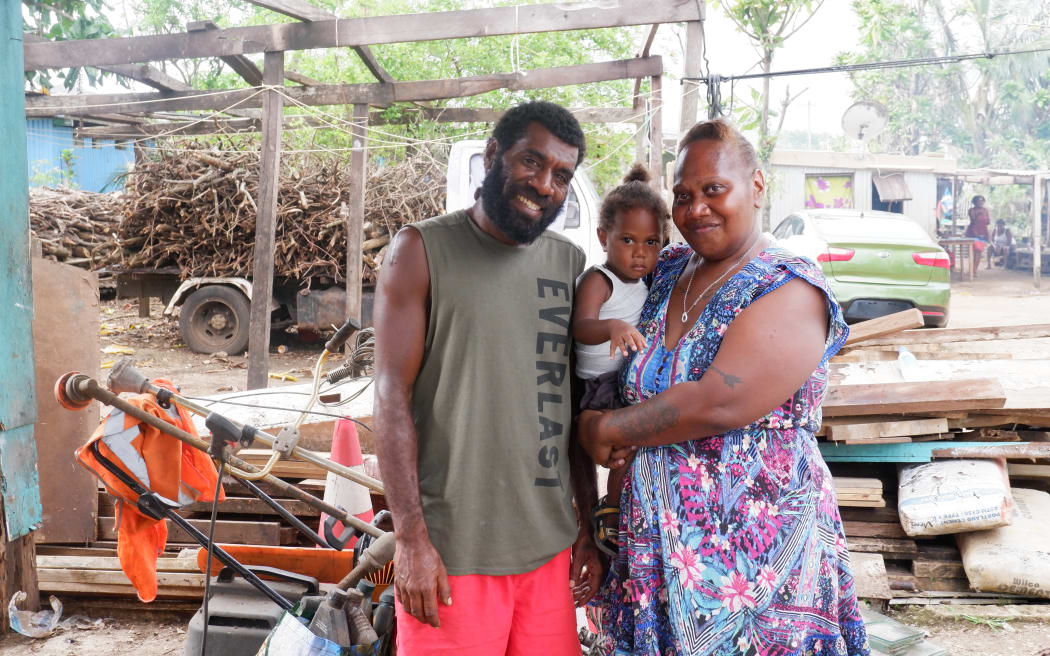Ni-Vanuatu people living with impacts of cyclones Judy and Kevin a month on
Tuesday 4 April 2023 | Written by RNZ | Published in Vanuatu

Frederica Atavi (right) with her son and husband Tom, feels the post-cyclone response has been slow. Photo: RNZ Pacific / Caleb Fotheringham / 23040407
Communities in Vanuatu continue to rely on government for basic necessities and still lack access to clean water sources almost a month after severe tropical cyclones Judy and Kevin made landfall.
Sisead Village community council chairman Paul Fred in Port Vila lives in one of the many homes in which residents do not have water seeping into the house because of a tarpaulin handed out in aid that lines his corrugated tin roof.
"To accept two cyclones within a week, it's unexplainable. We've never experienced two cyclones like this one," Fred told RNZ Pacific.
"But it's a good experience for the generations of today, it comes to remind them that we have to prepare."
His village is one of five in the country requesting financial assistance from the Prime Minister Ishmael Kalsakau's government to build houses that are strong enough to withstand the impacts of severe tropical cyclones.
"The government should focus to help Ni-Vanuatu people to build cyclone-proof buildings so that when the next cyclone comes we can minimise the need for relief and donations," he said.
'It's up to themselves'
Frederica Atavi is from the same community.
Atavi, who grew up in Australia, said a post-cyclone assessment was still needed to be done in the village.
"It's nearly a month now and you can see there's still rubbish on the side of the road," Atavi said.
"It is slow but that's probably the island life. It's slow and steady."
Like Fred, she wants financial assistance to go towards rebuilding homes for the people in her community.
"The people in Vanuatu don't have access to financial aid or anything to help them with their structural damage," she said.
"It's only the food and the hygiene kits but for structural damage it's up to them to do it themselves."
Charlie Willy, also from Sisead, stayed in the village during both the cyclones.
During Kevin, while the older people were moved out of the village for safety, Willy and six others stayed in a concrete bathroom block, so they could nail down roofs in the middle of the storm.
Willy said roofs were still leaking and it was challenging for people to pay for materials to fix homes.
Water source declared unsafe
In the rural village of Pang Pang, about an hour drive away from the capital, Serah John, who tends the community's gardens, said the village had become reliant on food from government aid.
"All the gardens, the fruits and food crops were damaged... bananas and cassava that were uprooted from the strong wind," John said in bislama.
She said their clean water source had been contaminated by livestock waste after Cyclones Judy and Kelvin and declared not safe for human consumption.
Kalsakau told RNZ Pacific last month that the damage caused by the twin cyclones would cost the country tens of million of dollars.
New Zealand providing help
New Zealand Foreign Affairs Minister Nanaia Mahuta was in Vanuatu for three days last week and visited both villages.
She announced a $NZ1 million grant to support post-cyclone recovery efforts that would be made available to local non-governmental organisations.
Mahuta also meet with her counterpart Jotham Napat to sign the first-ever cooperation agreement between the two countries.
The deal will see the New Zealand government provide almost $NZ38m as part of its commitment to assist Vanuatu - with the money going towards climate change resilience projects, general budget support, and the tourism sector.
Mahuta said the resilience of the Ni-Vanuatu people stood out.
"You can not truly appreciate resilience until you come into communities where there has been absolute devastation," she said.
"Yet the people still pull together, they still smile, they still have the endurance factors that help them get through, something which I think is probably emotionally and mentally draining," she said while visiting the Pang Pang community.
"It reinforces why the world needs to take action on climate change because those most vulnerable in the Pacific require us all to do our bit."
RNZ














































